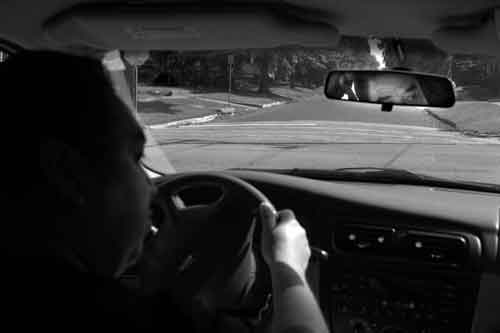
Cutline: As an undocumented worker, Benito drives with extreme caution. Although legislation passed in Springfield allows undocumented immigrants to secure driver’s licenses, the application is bureaucratic and immigrants are suspicious of the process.
Benito is a soft-spoken, muscular man who smiles warmly but has the tight expression of a chronic worrier. He lives and works in central Illinois, struggles with English, marches in anti-fracking rallies, has dreams for his children and pays his taxes on time.
He and his wife left their four children with their grandparents in Mexico and walked over the border into the United States 15 years ago seeking jobs, and for Benito, that was a Rubicon decision. They walked for days through the Arizona desert after running out of food and water and nearly died of heat stroke.
Since then, Benito has worked one sometimes two jobs, often from 7 a.m. to 11 p.m. He’s one of an estimated 12 million undocumented immigrants living in this country. There are about 7,000 Hispanics in the Peoria area, and an estimated 2,000 of them are undocumented.
State Sen. Dave Koehler, D-Peoria, said Illinois has done what it can as a state to resolve this situation and federal legislation is needed to provide a pathway to citizenship. U.S. Rep. Aaron Schock, R-Peoria, voted against the Dream Act but has expressed the need for a clear path to citizenship for workers who are already here. He makes an economic case for reform, citing Illinois industries, including agriculture and manufacturing, that grapple with problems hiring immigrant workers.
Economists confirm undocumented workers have lowered wages for adults without a high school diploma, but the impact on everyone else is positive, allowing skilled workers to become more productive.
One study from University of California, Davis, found that from 1990 to 2007, undocumented workers had the effect of increasing legal workers’ pay in complementary jobs by up to 10 percent.
Chris Doscotch, a Peoria attorney, said, “People who are rational and reasonable know this immigration issue has to be resolved. We can’t deport everyone. It’s not practical. As homeland security tightens, people without status are pushed further underground.”
He said an undocumented worker earning $9 an hour as a dishwasher pays Social Security taxes but will never collect Social Security. By contrast, a millionaire who earns income through capital gains pays no Social Security tax.
“If immigrants were brought into the regular economy, it would increase wages for everyone,” Doscotch said.
Speaking with Jennifer Carrillo, Illinois People’s Action, as an interpreter, Benito said he knew life in American would be difficult but he needed work to support his growing family. He expected to struggle, but he didn’t expect the profiling, discrimination and “being treated less than human.”
“You feel the weight of that,” he said.
After about three years in this country, Benito’s mother-in-law became sick and his wife went home to Mexico to care for her. His wife has never been able to return to central Illinois, and Benito can’t travel to Mexico without the risk he’d be unable to return. They haven’t seen each other for 11 years, and they talk by phone.
“I don’t have the physical strength anymore to cross the border, and I don’t have the guts,” he said.
At 49, Benito has paid into Social Security for 14 years, but he’ll never collect any retirement benefit. He said age discrimination in Mexico is widespread and anyone over 50 won’t find employment.
He works in a restaurant that routinely schedules four employees in the kitchen but on shifts with undocumented workers, there are just two employees dealing with the same volume of work.
“I don’t have the freedom to find another job,” he said. “I have no recourse.”
In 14 years, he’s never had a vacation but took one “forced vacation” when his foot was broken in a kitchen accident, and he needed multiple operations.
He has been profiled, once by a police officer who followed him on his 10-minute drive to work. When he pulled into the restaurant parking lot he was ticketed for failing to use a turn signal, but Benito was sure the turn light was blinking.
Carrillo said, “Benito will never be able to fix his status. Once you cross the border without papers, there is no way to legalize. We need a reform of the system and a path to ask for pardon.”
Benito sighed deeply when asked if he regrets coming to the United States. Yes and no, he said. He had no choice but to earn money to support his children. They have all attended school and are educated, but he missed out on key years in their lives. He has grandchildren he’s never seen.
Rev. Adrian Garcia, First United Methodist Church, said most immigrants coming to Peoria currently are fleeing violence in Honduras, El Salvador and Guatemala.
Garcia said Peoria is generally a safe place for immigrants. Law enforcement in other communities has worked aggressively with Immigration and Customs Enforcement to detain people, but “in the Peoria area, the mood is more reasonable,” he said. Still, people usually wait over 20 years for a VISA.
As the country’s demographics change, Hispanic voters are gaining increasing clout in elections. White Americans likely will be the minority by 2018 for those under 18 and by 2027 for those between 18 and 29. By 2060, whites will be the minority in all age categories.
